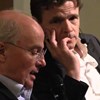commented

The future of democracy part 2 - comments and discussion
The 6th of March 2014 Chantal Mouffe came to Sweden to talk about the Future of Democracy: How to face the challenge of the protest movements.

The Future of Work with Richard B Freeman
The future of work: the paradox of increased team production and greater inequality in pay in the knowledge economy. A seminar from Stockholm on the 14th of October 2013. Labour economist Richard B Fr
Daniel Wikler: Ethics and E-cigs. An analysis and a proposal
Daniel Wikler, Mary B. Saltonstall Professor of Population Ethics and Professor of Ethics and Population Health at the Harvard School of Public Health ABSTRACTTwo letters on electronic cigarettes (“E-c

Ethics and E-cigs. Daniel Wikler on smoking and health
Two letters on electronic cigarettes (“E-cigs”) reached Dr. Margaret Chan, Director-General of the World Health Organization in mid-2014, each signed by dozens of tobacco control specialists. One comm
Archives of/as resistance: On the justice potential of eyewitness image records documenting the Syrian conflict
Media, Culture & Society Abstract What are the new possibilities of enacting justice through the vast archives of digital eyewitness images and self-representations produced since 2011 by the grassr
Injunctive Versus Functional Inferences From Descriptive Norms Comment on Gelfand and Harrington
Journal of Cross-Cultural Psychology, 0022022115605387. Abstract Cialdini has argued that whereas injunctive norms motivate behavior by their promise of social sanctions, descriptive norms motivate beha
Values and Vampires: Why Moral Axiology Withstands the Argument From Queerness
Ethical Theory and Moral Practice Abstract The argument from queerness is one of the most important arguments for moral error theory. Moral error theory holds that moral discourse is hopelessly flawed o
Comment on Bratsberg, Raaum and Røed: Educating children of immigrants: Closing the gap in Norwegian schools
Nordic Economic Policy Review. Economics of Education, No. 1:253-260, 2012
Climate Change, Historical Emissions, and Unjust Benefits: A Comment on Axel Gosseries’ Account of Climate Justice
Journal of Practical Ethics Abstract One of the claims Axel Gosseries makes in What is Intergenerational Justice? is that greenhouse gas emissions produced before 1990 are morally unimportant for presen
"Try to Balance the Baseline": A comment on "Parent-teacher meetings and student outcomes: Evidence from a developing country" by Islam (2019)
European Economic Review Abstract Islam (2019) reports results from a cluster randomized field experiment in Bangladesh that examines the effects of parent–teacher meetings on student test scores in pri








